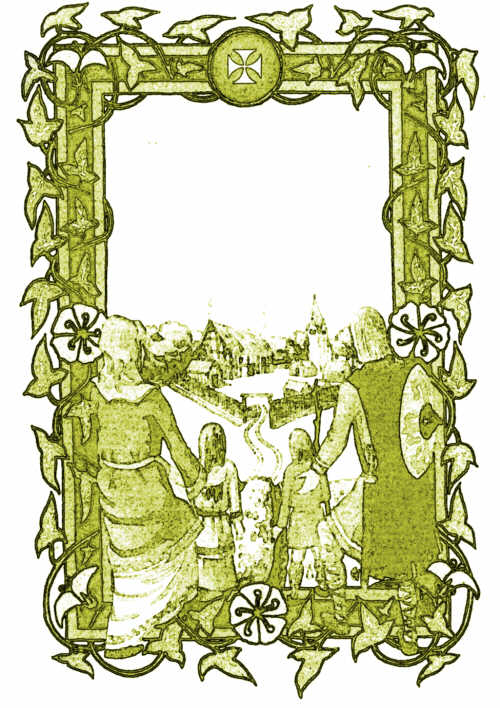
![]()
Excerpt
from: Volume 5 Issue 4 Date 1st June 2002
![]()
The Resurrection of Godwinstowe
In Old English, Godwinstowe means the holy place of the friend of God. Godwinstowe is not a place, but an allegory of Orthodox England.
Once a year, it is said, at midnight, on the anniversary of its burning by William's men, the old homes and monastery of Godwinstowe rise up from the earth where they have hidden, straining but suppressed, these thousand years. From behind each shutter, so they say, glows a weak light and there comes forth a weeping like a low piercing voice in agony of death, a weeping for lost happiness, a lament for England lost. And then the moon ripples silver over the stream, the swaying trees answer in deep, hollow tones, and the echoes of this tangled melody ring through the forest.
But I believe, as all the trees in the forest
believe, and all the wild beasts of the woods, all the fowl of the air,
large and small, as the fox and the hare believe, as the mole believes,
burrowing with difficulty its winding passages beneath the roots of the
ash and the birch, as every quivering leaf believes, as every fragrant
blossom believes, and every piece of moss and every crumb of earth, that
the Day of Resurrection will come. Nay, we do not believe it, we know
it, and we live it, and we have ever lived and breathed by the knowledge
of it.
That Day will be like every other day, rising
with the rosed dawn, pinning the star of the sun to the top of the tallest
oak in the forest. The trees will not change their shapes, nor the animals:
folk will not change their forms, nor the air be less sweet, nor the water
less clear, nor the frost less sparkling, nor the summer warmth less warm.
Neither by sight nor by sound will anyone or anything feel the difference.
Only suddenly, between one moment and the
next, all worries will flee away. Even the stones will feel ease and joy
and lightness, as though they could fly. And on account of this all will
be different.
Above the trees where once stood Godwinstowe,
the red edge of dawn will begin to show.
And Godwin the hermit, the conscience of
England, waiting in his grave, buried beneath the monastery and a thousand
years of earth and grass, will wake in live amazement, his bones reclothed
in flesh. After him, all generations of the monks of the monastery and
the villagers, men, women and children, will rise up too in the same way
and begin to follow him, as before. They, banned all these long years
from the light of the earthly sun, will behold the light. They will see
the woods and fields green again, and the bright fish swimming in the
stream, and the meadowland by the bridge, and the old, white church by
the hall, and the watermill, and their own dear homes. Still not understanding
what has happened, they will rise and, following the hermit Godwin, they
will begin to walk over the soft English grass again, as it was of old.
Blinking, dazzled, they will look at the
richness of the living wood, lit by the morning light. They will touch
the good earth with their feet and feel its damp and dewy caress. That
will revive them. A while they will stand, then they will go up from the
stream by the shade of the trees. Up on the hill, they will look, their
eyes glistening transfigured with the look of the just who have received
their reward, whose work is done. And they will look in all wonder at
the beauty of God's first and last, restored and deathless Creation, that
Godwin saw in prayer of old. And they will say: 'So, what was foretold
is then true, just as we all were told, just as we all believed ...'
And all over England, in countless long-disappeared
hamlets, others too, like Godwin and his field of faithful folk, will
see the first night of the new world. And when the sun goes down in fiery
brightness, the moon will wake, but not to new trials and tears, sorrows
and ill omens. Battle and strife and the heat of the day will be over,
for ever and ever and ever. And the strength of the new earth will go
forth to the stars which show the path to the Milky Way, which leads straight
to the gates of Paradise.
And everywhere, in all places on this long-tormented
earth, spiritual prisons will open, the places of the torture and pain
of sin will for ever close, the undiscovered lairs of the persecuted,
the clefts in the rocks, will open, as will the unruined hiding places
of hunted souls and the secret caves of the heart that were never found.
Folk will rise up from them, and walk among the fair fields and in the
greenwood and sing to God. Resounding, the clear echo will surge up together
with the swelling tide of prayer, mingling with the gentle breeze in the
trees, the quiet tread of the shy deer, the babble of the stream, the
never-ceasing melody of the grace of God that has ever flowed through
His Garden, all Creation.
And this will be the first Day of the Resurrection.
But how many more Crucifixions, like that
of England of old, must there be, how many grievous trials must man suffer,
to hasten this Day and make himself ready for this Victory?

(c) Orthodox England - Published within the English Deanery of the Church Outside Russia: with the blessing of the Very Reverend Mark, Archbishop of Great Britain and Ireland.